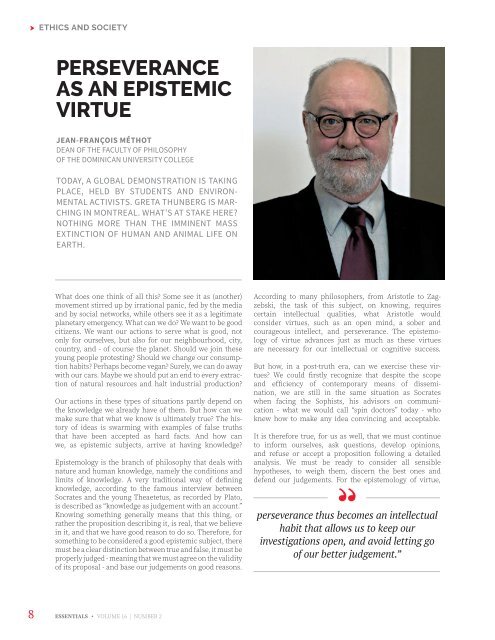Essentiel-Nr4-ENG-Web-preview
Create successful ePaper yourself
Turn your PDF publications into a flip-book with our unique Google optimized e-Paper software.
ETHICS AND SOCIETY<br />
PERSEVERANCE<br />
AS AN EPISTEMIC<br />
VIRTUE<br />
JEAN-FRANÇOIS MÉTHOT<br />
DEAN OF THE FACULTY OF PHILOSOPHY<br />
OF THE DOMINICAN UNIVERSITY COLLEGE<br />
TODAY, A GLOBAL DEMONSTRATION IS TAKING<br />
PLACE, HELD BY STUDENTS AND ENVIRON-<br />
MENTAL ACTIVISTS. GRETA THUNBERG IS MAR-<br />
CHING IN MONTREAL. WHAT’S AT STAKE HERE?<br />
NOTHING MORE THAN THE IMMINENT MASS<br />
EXTINCTION OF HUMAN AND ANIMAL LIFE ON<br />
EARTH.<br />
What does one think of all this? Some see it as (another)<br />
movement stirred up by irrational panic, fed by the media<br />
and by social networks, while others see it as a legitimate<br />
planetary emergency. What can we do? We want to be good<br />
citizens. We want our actions to serve what is good, not<br />
only for ourselves, but also for our neighbourhood, city,<br />
country, and - of course the planet. Should we join these<br />
young people protesting? Should we change our consumption<br />
habits? Perhaps become vegan? Surely, we can do away<br />
with our cars. Maybe we should put an end to every extraction<br />
of natural resources and halt industrial production?<br />
Our actions in these types of situations partly depend on<br />
the knowledge we already have of them. But how can we<br />
make sure that what we know is ultimately true? The history<br />
of ideas is swarming with examples of false truths<br />
that have been accepted as hard facts. And how can<br />
we, as epistemic subjects, arrive at having knowledge?<br />
Epistemology is the branch of philosophy that deals with<br />
nature and human knowledge, namely the conditions and<br />
limits of knowledge. A very traditional way of defining<br />
knowledge, according to the famous interview between<br />
Socrates and the young Theaetetus, as recorded by Plato,<br />
is described as “knowledge as judgement with an account.”<br />
Knowing something generally means that this thing, or<br />
rather the proposition describing it, is real, that we believe<br />
in it, and that we have good reason to do so. Therefore, for<br />
something to be considered a good epistemic subject, there<br />
must be a clear distinction between true and false, it must be<br />
properly judged - meaning that we must agree on the validity<br />
of its proposal - and base our judgements on good reasons.<br />
According to many philosophers, from Aristotle to Zagzebski,<br />
the task of this subject, on knowing, requires<br />
certain intellectual qualities, what Aristotle would<br />
consider virtues, such as an open mind, a sober and<br />
courageous intellect, and perseverance. The epistemology<br />
of virtue advances just as much as these virtues<br />
are necessary for our intellectual or cognitive success.<br />
But how, in a post-truth era, can we exercise these virtues?<br />
We could firstly recognize that despite the scope<br />
and efficiency of contemporary means of dissemination,<br />
we are still in the same situation as Socrates<br />
when facing the Sophists, his advisors on communication<br />
- what we would call “spin doctors” today - who<br />
knew how to make any idea convincing and acceptable.<br />
It is therefore true, for us as well, that we must continue<br />
to inform ourselves, ask questions, develop opinions,<br />
and refuse or accept a proposition following a detailed<br />
analysis. We must be ready to consider all sensible<br />
hypotheses, to weigh them, discern the best ones and<br />
defend our judgements. For the epistemology of virtue,<br />
perseverance thus becomes an intellectual<br />
habit that allows us to keep our<br />
investigations open, and avoid letting go<br />
of our better judgement.”<br />
8<br />
ESSENTIALS • VOLUME 16 | NUMBER 2




